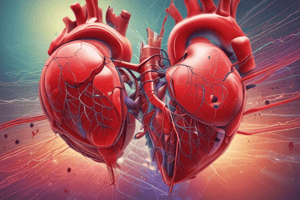Podcast
Questions and Answers
Which lipid is responsible for organizing inner mitochondrial membrane lipids and proteins?
Which lipid is responsible for organizing inner mitochondrial membrane lipids and proteins?
- Cholesterol
- Phospholipid
- Cardiolipin (correct)
- Triglyceride
Which genetic disorder is associated with a defect in the taffazin gene?
Which genetic disorder is associated with a defect in the taffazin gene?
- Antiphospholipid syndrome
- Mitochondrial dysfunction syndrome
- Barth syndrome (correct)
- Cardiolipin syndrome
What is the primary symptom associated with Barth syndrome?
What is the primary symptom associated with Barth syndrome?
- Cardiomyopathy
- Myopathy (correct)
- Neutropenia
- Growth delay
Which autoimmune disorder is characterized by the production of antibodies that react with cardiolipin?
Which autoimmune disorder is characterized by the production of antibodies that react with cardiolipin?
What is the main effect of oxidative stress on the cardiovascular system?
What is the main effect of oxidative stress on the cardiovascular system?
What are Advanced Glycation End-Products (AGEs)?
What are Advanced Glycation End-Products (AGEs)?
What is the preferred biomarker to detect myocardial injury?
What is the preferred biomarker to detect myocardial injury?
What is the main cardiovascular effect of aspirin?
What is the main cardiovascular effect of aspirin?
What is the most common marker used to evaluate acute myocardial infarction (MI) and risk-stratification in acute coronary syndromes (ACS)?
What is the most common marker used to evaluate acute myocardial infarction (MI) and risk-stratification in acute coronary syndromes (ACS)?
What is the cytosolic isoform of creatine kinase used for detecting additional cardiac muscle injury over time?
What is the cytosolic isoform of creatine kinase used for detecting additional cardiac muscle injury over time?
Which energy sources do cardiomyocytes primarily rely on in the fasted state?
Which energy sources do cardiomyocytes primarily rely on in the fasted state?
What happens to ATP synthesis in mitochondria when stores of glycogen are low?
What happens to ATP synthesis in mitochondria when stores of glycogen are low?
What is the function of the phosphocreatine shuttle in cardiomyocytes?
What is the function of the phosphocreatine shuttle in cardiomyocytes?
What is the effect of pathological cardiac hypertrophy on the PCr/ATP ratio?
What is the effect of pathological cardiac hypertrophy on the PCr/ATP ratio?
What metabolic adaptations occur in response to pressure-overload hypertrophy and dilated cardiomyopathy?
What metabolic adaptations occur in response to pressure-overload hypertrophy and dilated cardiomyopathy?
What is the role of adenosine in regulating cardiac function?
What is the role of adenosine in regulating cardiac function?
What happens to intracellular Ca2+ levels when adenosine is produced in cardiac myocytes?
What happens to intracellular Ca2+ levels when adenosine is produced in cardiac myocytes?
Which phospholipid is abundant in the heart?
Which phospholipid is abundant in the heart?
Which phospholipid is synthesized in mitochondria?
Which phospholipid is synthesized in mitochondria?
What is the structure of mature cardiolipin?
What is the structure of mature cardiolipin?
Which of the following is true about the energy metabolism in the heart?
Which of the following is true about the energy metabolism in the heart?
What is the role of peroxisome proliferator-activated receptor α (PPARα) in cardiac metabolism?
What is the role of peroxisome proliferator-activated receptor α (PPARα) in cardiac metabolism?
What is the function of the phosphocreatine shuttle in the heart?
What is the function of the phosphocreatine shuttle in the heart?
What is the adenosine hypothesis?
What is the adenosine hypothesis?
What is the function of cardiolipin in the heart?
What is the function of cardiolipin in the heart?
What is the role of oxidative stress in cardiovascular disease?
What is the role of oxidative stress in cardiovascular disease?
What are advanced glycation end-products (AGEs) related to in cardiovascular complications?
What are advanced glycation end-products (AGEs) related to in cardiovascular complications?
How does aspirin relate to eicosanoid synthesis and its cardioprotective effects?
How does aspirin relate to eicosanoid synthesis and its cardioprotective effects?
What are some biochemical markers of cardiovascular disease?
What are some biochemical markers of cardiovascular disease?
What is responsible for the adaptation to hypoxic and ischemic conditions in cardiac metabolism?
What is responsible for the adaptation to hypoxic and ischemic conditions in cardiac metabolism?
Flashcards are hidden until you start studying
Study Notes
Lipid Organization and Genetic Disorders
- Tafazzin is responsible for organizing inner mitochondrial membrane lipids and proteins.
- Defects in the taffazin gene are associated with Barth syndrome.
- Barth syndrome is primarily characterized by cardiomyopathy and skeletal myopathy.
Autoimmune Disorders and Cardiolipin
- The autoimmune disorder characterized by the production of antibodies that react with cardiolipin is Antiphospholipid Syndrome.
- Cardiolipin is a phospholipid abundant in the heart, synthesized in mitochondria.
- The structure of mature cardiolipin is a tetra-acyl phospholipid.
Cardiovascular System and Oxidative Stress
- The primary effect of oxidative stress on the cardiovascular system is increased cardiovascular risk.
- Advanced Glycation End-Products (AGEs) are proteins or lipids that have become non-enzymatically glycosylated, contributing to oxidative stress.
- AGEs are related to cardiovascular complications, such as atherosclerosis and diabetic cardiovascular disease.
Biomarkers and Cardiovascular Effects
- The preferred biomarker to detect myocardial injury is Troponin.
- The main cardiovascular effect of aspirin is the inhibition of eicosanoid synthesis, leading to cardioprotective effects.
- Aspirin relates to eicosanoid synthesis through the inhibition of cyclooxygenase, resulting in reduced thromboxane production.
- The most common marker used to evaluate acute myocardial infarction (MI) and risk-stratification in acute coronary syndromes (ACS) is Troponin.
- The cytosolic isoform of creatine kinase used for detecting additional cardiac muscle injury over time is CK-MB.
Energy Metabolism in Cardiomyocytes
- Cardiomyocytes primarily rely on fatty acids as energy sources in the fasted state.
- When stores of glycogen are low, ATP synthesis in mitochondria decreases.
- The phosphocreatine shuttle is a mechanism that rapidly regenerates ATP in cardiomyocytes.
- The function of the phosphocreatine shuttle is to maintain ATP homeostasis during high-energy demand.
Cardiac Hypertrophy and Metabolic Adaptations
- Pathological cardiac hypertrophy is associated with a decrease in the PCr/ATP ratio.
- Metabolic adaptations in response to pressure-overload hypertrophy and dilated cardiomyopathy include increased glucose uptake and glycolysis.
- Adenosine regulates cardiac function by reducing heart rate and contractility.
- When adenosine is produced in cardiac myocytes, intracellular Ca2+ levels decrease.
Energy Metabolism Regulation
- Peroxisome proliferator-activated receptor α (PPARα) regulates cardiac metabolism by promoting fatty acid oxidation.
- The adenosine hypothesis proposes that adenosine acts as a metabolic sensor to regulate cardiac energy metabolism.
- The role of oxidative stress in cardiovascular disease is to promote inflammation and cellular damage.
- Hypoxia-inducible factor-1α (HIF-1α) is responsible for the adaptation to hypoxic and ischemic conditions in cardiac metabolism.
Studying That Suits You
Use AI to generate personalized quizzes and flashcards to suit your learning preferences.




